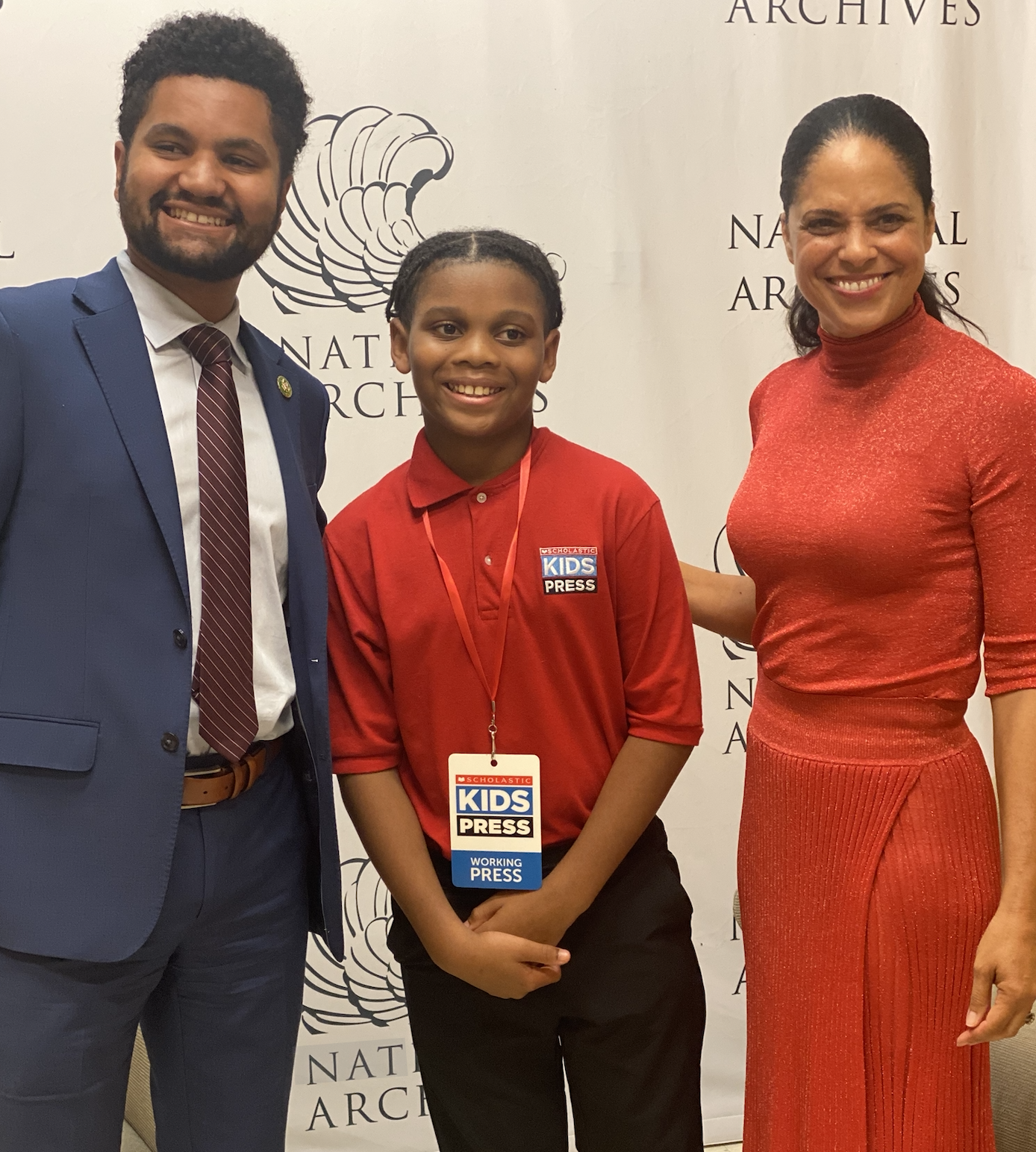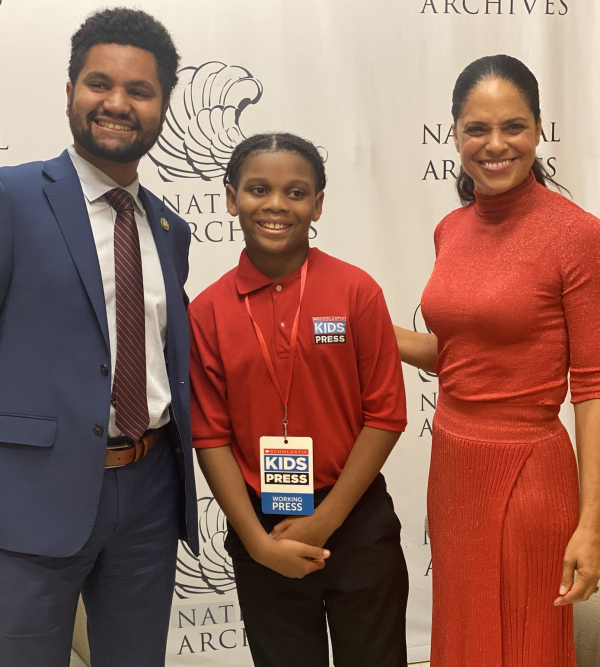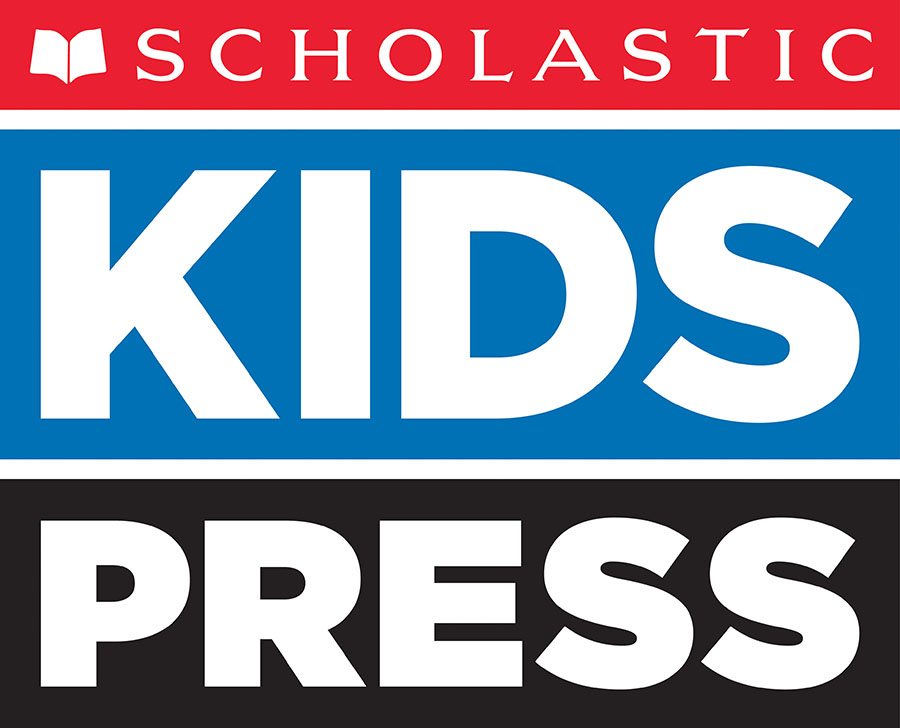KID REPORTERS’ NOTEBOOK
A Conversation With Soledad O’Brien


Xander poses with journalist Soledad O’Brien and U.S. Representative Maxwell Frost (D-FL).
In June, I spoke with journalist Soledad O’Brien after she moderated a discussion with United States Representative Maxwell Frost (D-FL) at the National Archives Museum in Washington, D.C. An award-winning journalist, O’Brien has worked at CNN, HBO, and other news outlets. In 2013, she founded Soledad O’Brien Productions. The organization is dedicated to telling stories about a range of social issues.
O’Brien has a large following on social media, where she discusses events of the day. I asked her about her journalism career and what advice she has for aspiring reporters. Here are highlights from our conversation, which has been edited for length and clarity.
What drew you to the field of journalism and, specifically, covering political events?
My sister and I were both pre-med in college. She’s a surgeon today, and I’m not. I realized when I attended Harvard University that I wasn’t that passionate about medicine. I thought it was important to love what you’re going to do for your career. I started working at a TV station, partly because I could do an internship there. I could walk to get there. And I realized that I loved it. I wasn’t working in the newsroom, but I was working near the newsroom. My job was to get people lunch and ask, “Would you like fries with that?”
I didn’t have a very good job as my first job. I just loved the excitement of it, and I loved the newsroom energy. I also loved that no matter what happened at the end of your show—it could have been a terrible show—it was over, and the next day you started again, completely fresh. Over time, politics started taking over a lot of our lives in a lot of ways. I found myself covering more and more politics.
Can you share some of your experiences covering political events?
In 2016, President [Barack] Obama asked me to interview him during his historic trip to Cuba. He was talking with a lot of entrepreneurs, and they were just starting to run businesses. Cuba is a Communist country, so it was difficult for people to run independent businesses. He was supporting those businesses.
There was only one earpiece for the interview. They gave the earpiece to the President. My Spanish is OK, but it’s not great. I couldn’t understand what was being said. It was kind of crazy, but it was a lot of fun. I brought my whole family with me. We were on vacation and met with some of my relatives there, too.
In today’s fast-paced news environment, where information spreads rapidly through social media and various news outlets, what role do you believe in-depth reporting plays in providing accurate and reliable information to the public?
It’s challenging because you’re right—social media is so much faster. When there’s an earthquake in California, for example, I know exactly when it happens because of Twitter. Suddenly, everyone on Twitter says, “Did you feel that?” Everyone knows something is happening. In a way, that’s so much faster than what you could ever do on television news.
On TV, we’d have to say, “We’re getting reports.” Then we’d have to confirm those reports. Then we’d have to set up cameras. It takes so much more time. Sometimes, sloppiness comes with speed, as well as guessing and getting to the wrong conclusion.
I do a show now called Matter of Fact with Soledad O’Brien. On the [nationally syndicated weekly] show, we explain a lot of stuff. It’s not about getting a lot of viewers, though we do well. It’s not about entertainment. Our show is about serving our audience. Everybody is talking about the First Amendment. My job is to say, “Let’s back up a little: What is the First Amendment? Everyone is talking about it. What exactly is it?”

“Sometimes, sloppiness comes with speed,” O’Brien says about social media.
How do you ensure objectivity and impartiality in your reporting?
People ask for that, but I’d rather know where you’re coming from. What does it mean to be objective? You and I, I’m sure, grew up differently. I’m older than you are. I grew up in New York, on Long Island. I used to live next door to a cornfield. If we have a different take on something, are you more objective than I am? If you tell me, “I don’t come in with any thoughts on this at all,” that’s kind of scary to me. It doesn’t make me feel like you’re going to be a good reporter. It makes me feel like I want you to read more. I’d much rather know where you’re coming from. I would argue for transparency. What you should aim for is doing a good job on the story to give everyone an opportunity to be presented fairly. So, be careful about your own bias. But sometimes, people use objectivity as a shield, claiming that they’re completely objective and have no point of view. Really? No point of view?
What advice would you give young people who are considering a career in journalism?
Journalism is all about writing. Write. Start writing now. Start writing even if you’re terrible. Then. do a second draft and a third draft and really try to find your voice. How do you sound?
One of the things I had to really figure out was what Soledad O’Brien sounds like. What’s my take on this story? What do I bring to this story? So I can add value as a reporter. I’m not just standing there like a stick figure pretending to be something I’m not. It takes a fair amount of time to figure out your voice. It can be a little hard. The good news is with a lot of practice, you can get it. I always encourage people to just practice all the time. Write all the time. Tell stories all the time. Do interviews all the time, and you’ll get good at it.
